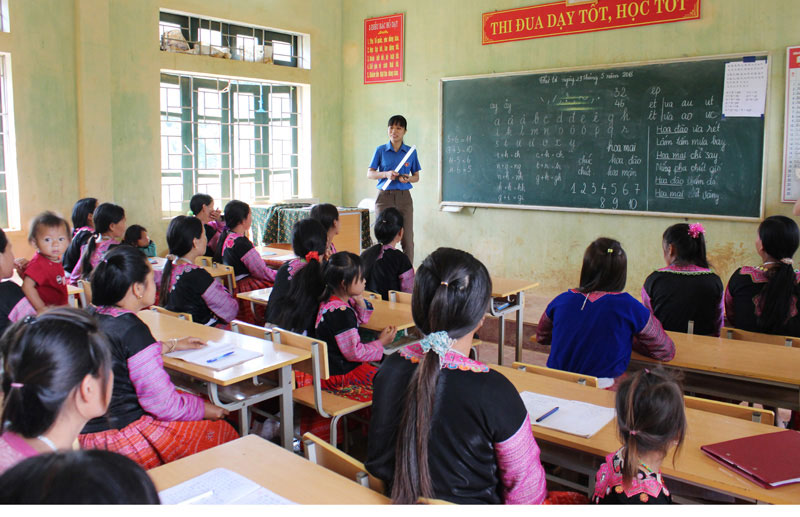
(HBO) – As of September 2018, all the 23 communes and towns of Mai Chau district completed the universalizing of nursery education for children aging five years old and met all the criteria for the popularization of primary education at the third level, secondary education at the second level, and standards of illiteracy eradication at the second level.
However, in reality, the universalizing of
nursery, primary and secondary education and literacy eradication has been
modest in scale, with unstable efficiency in many communes.
The ratio of re-illiteracy remains high,
while the education universalizing for children at right age is unstable in
many poor communes and areas such as Hang Kia and Tan Dan, requiring regular
measures of settlement. This is the most challenging issue in education universalizing
in Mai Chau.

The organisation of illiteracy eradication
classes in Hang Kia in March 2018 was considered a breakthrough in the
education popularising and illiteracy elimination of Mai Chau district.
Hang Kia is a "hot spot” in illiteracy of
Mai Chau. Statistics showed that it is home to about 800 illiterate and
re-illiterate people aging from 18 years old and above.
With the poverty rate of 55 percent, locals
who finish primary education have no chance to access books after they get
married, thus becoming illiterate again, which is the main reason for the high
illiteracy rate.
Some other people do not go to school and
become completely illiterate. Many cannot speak Vietnamese, which prevent them
to make conversations and refuse to learn.
With the support of the provincial
Department of Education and Training, in March 2018, Mai Chau opened three classes
to eradicate illiteracy at the first level for 76 trainees.
From the success of the classes in the
Hang Kia B primary and secondary school, on August 14, 2018, Mai Chau continued
launching four other classes for 92 locals. All the trainees are women from
Mong ethnic minority group at the age of 18-24. After these classes, the outcomes
of illiteracy elimination in the district will be significantly enhanced./.
More than just an information technology teacher, Bui Van Nien is an inspiring figure who has nurtured the scientific curiosity and creative spirit of students in Vietnam’s ethnic minority communities.
Da Bac is the most disadvantaged mountainous district in Hoa Binh province, with ethnic minorities accounting for about 90% of its population. Over the past years, the district has mobilised resources to implement ethnic policies to improve the quality of life of local people.
In recent years, Hoa Binh province has consistently prioritised the protection, care, and education of children, particularly those from ethnic minorities and disadvantaged backgrounds, by creating a safe, healthy, and nurturing environment for their all-round development.
The Steering Committee for Tobacco Harm Prevention and Control of Hoa Binh province, in coordination with the Tobacco Harm Prevention and Control Fund, held a ceremony on May 28 in response to the World No Tobacco Day (May 31) and the National No Tobacco Week (from May 25 to 31). The event was chaired by Nguyen Van Toan, Standing Vice Chairman of the provincial People’s Committee and head of the Steering Committee.
Since 2021, the Center for Industrial Promotion and Industrial Development Consulting (CIIDC) under the Department of Industry and Trade has been implementing a school lighting model as part of the plan for using energy efficiently and economically in Hoa Binh Province in the pẻiod of 2021 - 2025. This model not only aims to improve the learning conditions and enhance the education quality, but it also promotes the message of energy saving, energy security, environmental protection and contributes to the goals of socio-economic development.
In the 2024 - 2025 school year, the entire Hoa Binh provincial education sector includes 520 educational institutions and schools. Among them are 13 ethnic boarding schools with 153 classes and 4,487 students. Four of these schools have met national standards, reaching 30.7 percent.



